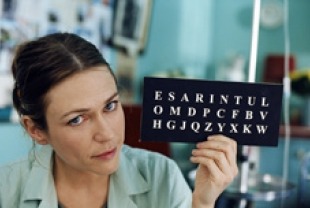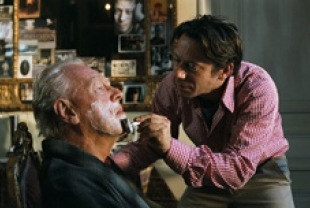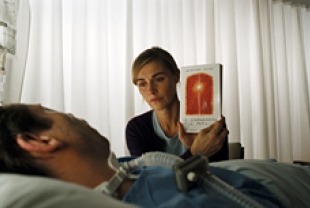In 1995 Jean-Dominique Bauby, editor-in-chief of French Elle and the 43-year-old father of two small children, was paralyzed from head to toe by a stroke to his brain stem. After 20 days in a coma, he awoke able to communicate only by blinking his left eyelid. With tremendous determination and creativity, Bauby wrote a memoir of what it is like to suffer "locked-in syndrome."
Julian Schnabel (Before Night Falls) has brought Bauby's work to vibrant life with a screenplay by Ronald Harwood. In an interview the director has stated:
"Does it take locked-in syndrome to make a human being conscious, to make others empathize? Do we have to get sick for the angels to appear and help us? . . . This is the story of all of us, who surely do face death and sickness. But if we look, we can find meaning and beauty here. I wanted this film to be a tool, like his book, a self-help device that can help you handle your own death. That's what I was hoping for, that's why I did it."
This amazing work of art reveals what it is like to square off against loss and death on a daily basis. Watch closely, and you will see ways in which it is possible to endure and create something of inestimable value out of suffering.
When Jean-Dominique Bauby (Mathieu Amalric) is told by Dr. Lepage (Patrick Chesnais) that he is paralyzed, he responds internally to the shattering news and its consequences. But throughout his ordeal, there is a playfulness about Bauby's wit that helps carry him through many very serious moments. The trick is a lightness of being that defies dread. When speech therapist Henriette (Marie-Josee Croze) enters the room, it's as if she were an angel. And perhaps she is given how she sets him up to communicate with the world. She teaches him an alphabet system where he chooses a letter by blinking yes. It is a slow process, spelling out words letter by letter, that is dependent for success upon the patience and perseverance of those who administer it. She passes the baton to Claude (Anne Consigny), who takes the dictation for his memoir. She makes the letters into sentences and paragraphs in a variety of different settings once Bauby is able to be moved around in a wheelchair. The positive attitude of these women gives the patient the courage and confidence he needs to write his memoir.
Other sources of support are the mother of his children, Celine (Emmanuelle Seigner), and his two young children, who visit regularly. He also welcomes Laurent (Isaach de Bakole), a friend who reads books to him. Bauby's memory enables him to travel wide and far. He fondly remembers his last meeting with his forgetful father (Max Von Sydow), who loves him dearly. Later in a phone call, his dad breaks down when he realizes that he will never hear his son's voice again. Roussin (Niels Arestrup), who took Bauby's seat on a plane which was hi-jacked and then spent four years as a hostage in Beirut, visits and helps him wipe away his guilt over that incident.
Throughout the movie, Bauby sees himself in a deep-sea diving bell sinking deeper and deeper into the abyss. But he escapes through the gift of his imagination, a point of view he calls the butterfly. He has a recurring fantasy about Empress Eugenie, the wife of Napoleon III, a patroness of the hospital. He also recalls an eye-opening trip to Lourdes. Bauby's lover refuses to come and see him, stating that she wants to remember him the way he was. This breaks his heart but he realizes hers is a very common response to paralysis and other terrible physical afflictions. And he is buoyed throughout his ordeal by the love of family, friends, the hospital staff, and his own creative spirit.
The Diving Bell and the Butterfly was published in 1997 and stands as a classic in the literature of illness. It salutes the firepower of imagination as a life-giver and a life-sustainer. The movie does full justice to Bauby's memoir and takes its place as one of the best films of 2007.
Special DVD features include: "Submerged: The making of The Diving Bell and the Butterfly"; a cinematic vision; an audio commentary with director Julian Schnabel; and Charlie Rose interviews Julian Schnabel.



